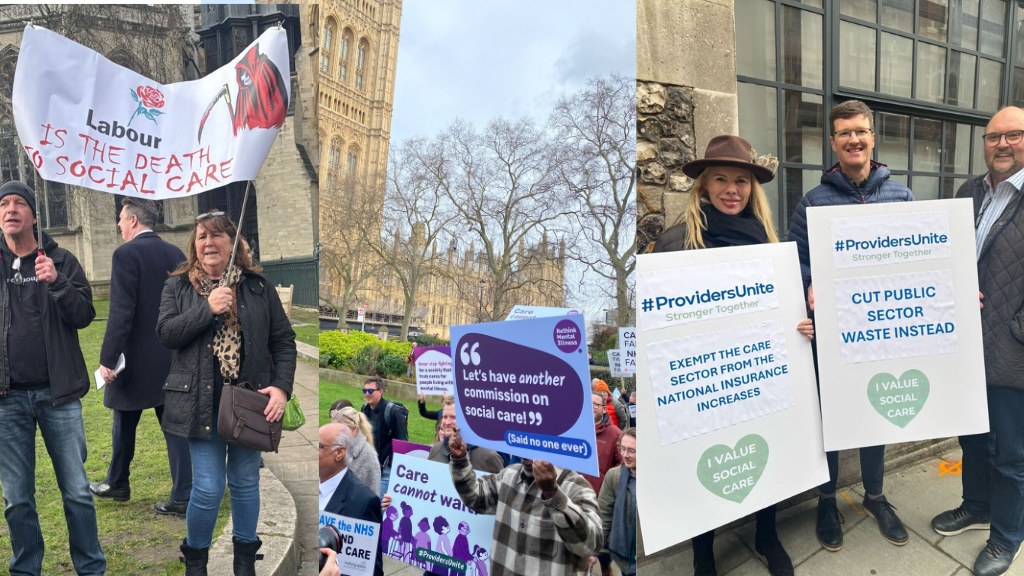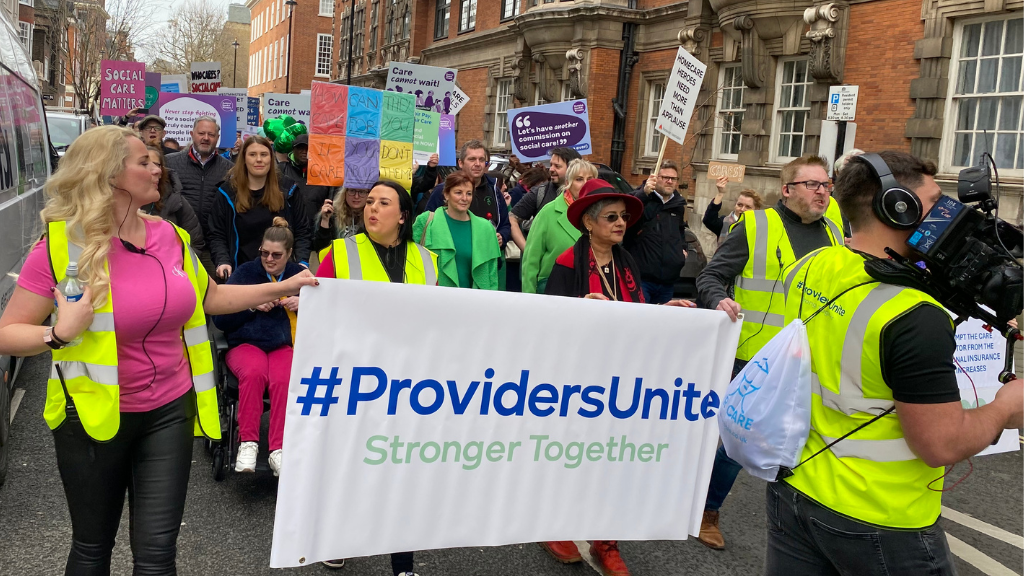Care professionals protest against government’s neglect of sector
Care operators and workers gathered for Providers Unite’s rally today in Westminster to protest the myriad problems facing social care, including funding and the National Insurance and wage cost increases.
Voices from across the industry including those in care homes, home care, advisory roles, adults with learning disabilities, and more marched from Great Smith Street to College Green outside the Houses of Parliament.

Professor Martin Green, chief executive of Care England, said: “Today’s demonstration by Providers Unite showed the depth of feeling there is in the care sector and reinforced the need for the government to take urgent action before it’s too late. What was great about today’s rally was that the sector came together with people who use services to demand a better deal for care.”
Cost increases are unlikely to be offset properly by local authority fee hikes, meaning many care businesses are at serious risk of closure. Other key concerns include the inadequate interlinking of the NHS and social care, how cost increases may impact care worker pay, and the commissioning of care.
Clare Connell, founder and chief executive of Connell Consulting, said: “The Treasury miscalculated the cost impact on the care sector and it needs to be properly funded to avoid small businesses, charities and hospices having to close services.”

Neil Murray, director of care, quality and compliance at Bluebird Care commented: “The government wants to fix the NHS, but they will not get it right without social care. Look at the waiting times to get discharged from hospital. If the government looks at the whole picture it’s clear that until social care gets proper funding, the NHS will never be where it needs to be.”
Jamie Stuart, deputy head of health and social care at Virgin Money, said: “NIC is the real thing killing everybody. But you also need to properly integrate the NHS and social care. Around 75% of beds in the NHS are used by people who don’t need to be there.”
Karolina Gerlich, chief executive of the Care Workers’ Charity, told Caring Times: “We are worried this will lower care worker wages. We have heard care companies saying they will have to cap pay at minimum wage or, worse yet, close services. The local authorities have been commissioning unsustainable contracts for years. There should be a national minimum rate which covers everything including wages.
“There are also problems with immigration policy. The government needs to shift the policy back to allowing dependents to come with visa holders. Visa applications have severely dropped since this policy was enacted, meaning other countries offer their international workers better deals.”

Bhavna Keane-Rao, consultant at BKR Care Consultancy, said: “The fact that hundreds of people turned up to march in London shows the strength of feeling. We must now sit down with the policymakers and help find a solutions to this crisis.”
Jane Townson, CEO of the Homecare Association said: ““Councils are struggling to cover rising costs and are cutting care services. Losing access to quality homecare risks harm to people needing care; adds burdens to family carers; and piles pressure on an over-stretched NHS.
“This week, we stood united with homecare providers and their care workers with one message: enough is enough. The government’s refusal to exempt our sector from the latest National Insurance hikes, coupled with a lack of proper funding for the minimum wage increase, risks devastating disruption of homecare provision.”
One care charity told Caring Times that National Insurance and living wage increases are costing it around £200,000 a year. “Because we are only in one small area, it’s difficult to make up these costs with donations so we have to pass them on to service users. There really should be parity between health and social care.”
Martin Jones, chief executive of Home Instead UK and international, said: “Facing a rapidly ageing population and recruitment challenges, we need to boost the sector’s ability to provide quality care, delivered by a trained and motivated workforce. It all begins with greater support from the government, and particularly a review of rising employer National Insurance contributions. It’s a barrier to recruitment at a time when we’re seeing a rise in demand, especially for home care as more of us hope to spend our later years at home.”




